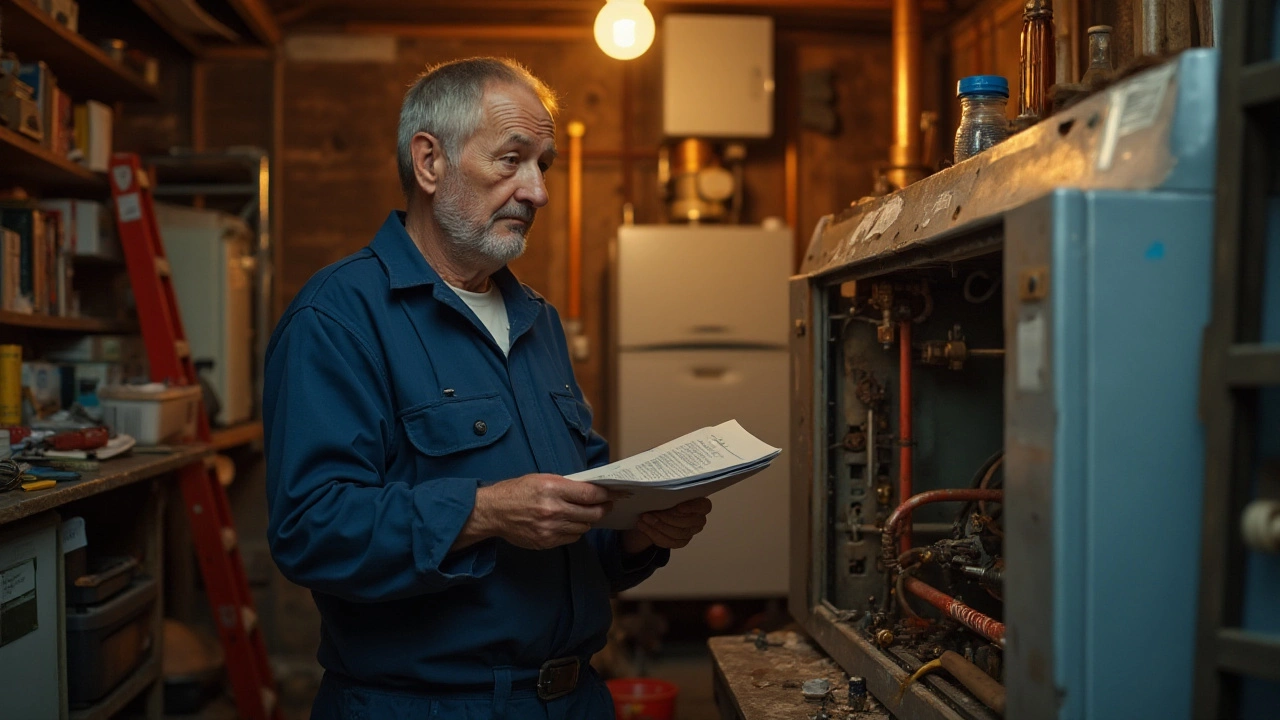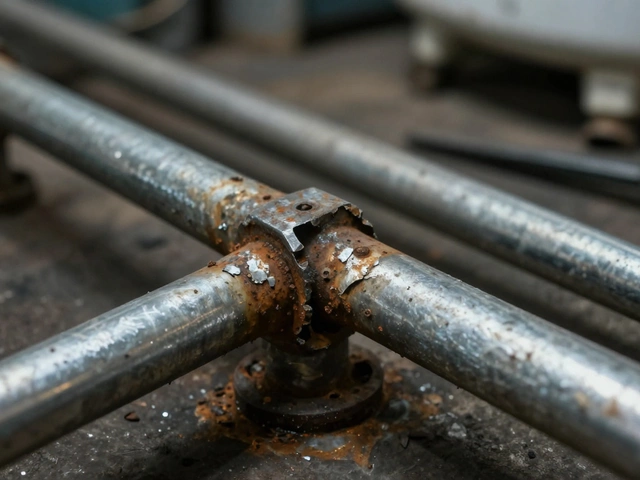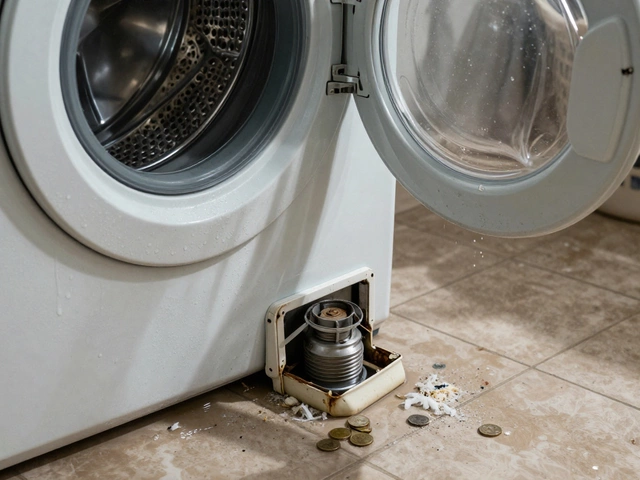Nothing quite disrupts the comfort of a home like a boiler on the fritz. Whether you're braving the winter chill or just needing reliable hot water, understanding the ins and outs of boiler repair time can be a game changer. The question remains: how long does it truly take to fix a boiler?
The time involved can vary significantly, often depending on the nature of the problem. Whether it's a minor issue or something more serious, each repair job comes with its unique set of challenges. It’s not always a stretch on the clock, but knowing what to expect can help ease the process and set realistic expectations.
Delving into common issues and understanding the steps a professional might take could save not only time but also money. Plus, a quick primer on what you might handle yourself or when to call in the expert can keep your heating system running smoothly. This guide walks you through each aspect, arming you with knowledge to make informed decisions.
- Common Boiler Problems
- Factors Affecting Repair Time
- Steps in Boiler Repair
- DIY Troubleshooting Tips
- Hiring the Right Professional
- Preventive Maintenance
Common Boiler Problems
Understanding the common issues that affect boilers can be incredibly useful, not only in diagnosing what might be wrong but also in taking proactive measures to prevent future problems. One of the most regular troubles homeowners face is the notorious noisy system. This often manifests as banging, whistling, or gurgling sounds, typically caused by a buildup of limescale or air in the system. In areas with hard water, limescale can accumulate quickly, contributing to inefficiencies and noise. Boilers are built to operate silently, so any unusual sound is a tell-tale sign that something is amiss and needs attention.
Another prevalent issue is loss of pressure. This can lead to inefficiency and inadequate heating. Pressure loss might be due to a leak in the system, recently bled radiators, or even a malfunctioning expansion vessel. Regularly checking the pressure gauge and keeping it within recommended levels can prevent major malfunctions. It's often a simple problem with straightforward solutions, but if left unchecked, it may result in more significant repairs.
Boilers sometimes exhibit a problem of not producing heat or hot water, which can be distressing, especially on a frigid winter morning. The reasons for this can range from pilot light issues to a malfunctioning thermostat or diverter valve. Each of these components plays a critical role in the heating process, and when one or more fails, it disrupts the entire system. In some cases, resetting the boiler or changing a setting might resolve the issue, but other times, expert intervention is necessary.
Leaks are another headache for homeowners. A boiler leak can occur from various places, such as the pressure valve, pump seal, or around the expansion tank. Ongoing leaks may damage other components, leading to costly repairs. Sometimes, identifying the exact source of the leak requires professional insights, making it more challenging for untrained eyes. Regular boiler check-ups and proper maintenance can significantly mitigate this issue.
According to industry insights shared by the Energy Saving Trust, "Annual boiler inspections are crucial in catching many common issues before they become major problems, saving homeowners both time and money in the long run."
Heating system fix often also deals with frequent thermostat problems. Whether it's issues with accuracy, wires becoming loose, or simply needing calibration or replacement, thermostats can surprise even the most tech-savvy among us. Checking thermostat settings and ensuring they align with your schedule and preferences can alleviate many inconveniences. Sometimes, investing in a smart thermostat can offer better energy management and control.
Finally, boilers tend to encounter a stuck motorized valve or a malfunctioning airlock. These less common issues can still cause significant headaches and require a seasoned professional for rectification. Keeping the system in double-check condition with regular servicing can ensure these errors remain minimal. Consistent maintenance is a simple yet powerful measure to avoid extensive repairs and ensure the boiler operates smoothly throughout its working life.
Armed with this knowledge of common issues, homeowners can approach potential boiler problems with confidence and clarity, ready to tackle small issues independently or knowing when to reach out for expert assistance. In the long term, understanding these nuances not only aids in maintaining comfort but also maximizes the longevity and efficiency of the beloved home heating system.
Factors Affecting Repair Time
When it comes to boiler repair, several factors can influence how swiftly the job gets done. First and foremost is the diagnosis of the problem. Simple issues such as thermostat errors or pressure level adjustments might be quickly identified and resolved, possibly within an hour or two. However, more intricate troubles, like a broken heat exchanger or a persistent leak, may require detailed investigation, extending the repair time significantly. The expertise of the technician also plays a crucial role in the diagnosis phase. An experienced professional with a keen eye can expedite the process, using previous encounters and knowledge to hone in on the problem with precision.
Another determinant is the availability of replacement parts. In some cases, parts might need to be ordered from specialized suppliers, which could halt progress for days or even weeks, depending on the rarity of the component. Common parts such as thermostats or valves might be readily available, reducing downtime significantly. A well-prepared technician who brings a stock of essential parts could also save considerable time. It's not unusual for technicians to carry a range of common parts in their service vehicles to mitigate the wait.
The age and type of the boiler is a further consideration. Older models can be tricky to repair due to obsolete parts or outdated mechanisms, which may require retrofitting or custom solutions to bring them back to functionality. Conversely, newer systems generally allow for quicker repairs because they are designed with more modular and interchangeable components. As technology advances, many modern boilers are equipped with diagnostic displays which can help both the homeowner and technician to understand the issues promptly. A quote from a well-regarded source might say,
"The complexity of advanced boiler systems can sometimes outpace the training of less experienced technicians," - a statement echoed by industry veteran, Richard Malone.
Lastly, consider the workload and schedule of the repair company. During peak seasons, such as the winter months when demand spikes, technicians can be stretched thin, causing delays simply due to the volume of calls for assistance. It might be beneficial to consider a well-reputed service with ample staff to handle emergency repairs promptly. Some companies offer priority services to customers who have annual maintenance contracts, which can also aid in getting your heating system fix more efficiently. Given all these factors, it’s clear there's no one-size-fits-all answer to how long a boiler repair might take. However, understanding these elements can provide peace of mind and help set realistic expectations when tackling boiler problems.

Steps in Boiler Repair
When it comes to fixing a boiler, the process involves a series of meticulous steps that skilled technicians follow to ensure the proper functioning of your heating system. The first step often involves a comprehensive diagnosis. Technicians will usually start by inspecting the exterior and interior of the boiler, looking for obvious signs of wear and tear, leaks, or any visible damages. An experienced technician might ask about recent issues you’ve noticed and listen for any abnormal sounds coming from the boiler. Listening is crucial, as certain noises can indicate specific internal issues.
Following the initial assessment, the next step is to delve into the specifics of the boiler repair. This is where the technician identifies the root cause of the problem. Often, this involves testing the pressure levels and examining the various components, such as the thermostat, pump, and heat exchanger. They will check if there are blockages within the system or if parts have become inefficient over time. It is not uncommon for pressure to drop due to leaks, which could point to a faulty valve or connection. The technician's detailed understanding of the heating system is vital here, as pinpointing the problem accurately can save both time and resources.
Once the problem is identified, the repair work begins. At this stage, replacement of broken or worn-out parts might be necessary. Skilled technicians will have access to a range of parts, ensuring that replacements are readily available. Typical parts that might need fixing include the pressure valve, thermostat, or circuit board. The timeline for this can vary, especially if specialty parts need to be ordered, but many common issues can be resolved quickly with the right expertise. It’s worth noting that a study by the Energy Saving Trust found that regular boiler maintenance can prolong the life of your heating system and potentially cut future repair times in half.
"Taking care of your boiler with regular check-ups not only saves energy but can add years to its life," says Robert Greenway, a leading HVAC expert.
The fourth step is thorough testing. After repairs or replacements, a technician must verify the effectiveness and safety of the boiler. This stage involves pressure testing, ensuring there are no leaks, and that the boiler operates efficiently. A good technician checks to see that the heating system is evenly distributing warmth throughout the residence. Testing also helps in confirming that the repair was successful and that no further issues linger. The testing phase can offer peace of mind, confirming that the boiler is ready to serve its purpose reliably.
Finally, after repair and testing, the technician provides advice on preventive care. Proper maintenance care includes tips such as setting your boiler to a safe temperature, regular cleaning, and even advice on when to service your boiler next. Understanding these steps can empower homeowners to engage with their home heating systems confidently. An informed owner can reduce their energy bills and enhance their home’s comfort. This step-by-step insight into the repair time process brings you a step closer to mastering home boiler maintenance.
DIY Troubleshooting Tips
Before you rush to call a professional for boiler repair, there are several DIY troubleshooting steps that might help diagnose or even fix the issue. These simple checks not only save time but could also save money if the problem is minor. Let's dive into these steps, keeping in mind that safety should always be a top priority when dealing with any heating system fix.
First and foremost, it’s important to check the power supply. This might seem obvious, but it’s a common oversight. Make sure your boiler is plugged in and switched on. Sometimes, tripped circuit breakers can be the culprit. If your boiler has suddenly stopped working, check your home's electrical panel for any tripped switches. Reset them if necessary and see if your boiler reboots. Many times, these simple steps can bring your boiler back to life without further ado.
Next, inspect the thermostat settings. Sometimes the issue might not be with the boiler itself but with the thermostat. Ensure it is set to the correct temperature and switched to the 'heat' setting. Batteries in wireless thermostats should be checked and replaced if necessary. A slight adjustment in these settings can often resolve the boiler repair predicament quickly.
Airlocks and frozen pipes are notorious in the winter months. Check for any unusual noises, like gurgling or banging, which can indicate trapped air in the system. Bleeding your radiators might solve this problem. Ensure the stopcock is open to allow water flow. For frozen pipes, try gently heating the pipe using a hairdryer, starting from the end closest to the boiler. This could unfreeze the water and get your system running again.
"Regular maintenance and early spotting of issues can reduce the risk of boiler breakdowns significantly." - Home Improvement Journal
Another helpful tip is to check the pressure gauge on your boiler. Boilers typically operate between 1 and 2 bars. If the pressure is too low, your boiler might need to be re-pressurized. Refer to your boiler manual for instructions on how to do this safely. Raising or lowering the pressure, in small increments, might solve the issue. Just remember not to over-pressurize as this can lead to further complications needing professional intervention.
If you've tried these steps and your boiler remains inoperative or if troubleshooting seems daunting, it might be time to call in the experts. Always err on the side of caution and contact a professional if you're unsure about any step in the process. These tips are meant to address common and minor issues, but some problems require a seasoned touch. Ensuring that your boiler maintenance is a regular affair will prevent many of these issues from arising unannounced.

Hiring the Right Professional
Finding the right boiler repair professional can seem daunting, but with a little guidance, you can make a choice that will save both time and stress. Many of us have faced the scramble to repair a heater in the dead of winter, and hence, it's crucial to understand what distinguishes an exceptional technician from a mediocre one. To start, credentials matter; always check for proper licensing and insurance. Each region may have different requirements for boiler technicians, whether it's certification or affiliation with industry organizations, such as the Gas Safe Register in the UK or HVAC Excellence in the US. These affiliations often ensure that the technician is up to date with the latest technologies and safety protocols.
Seek recommendations from neighbors or friends who have had similar work done. Personal testimonials can often provide insights that online reviews cannot. Additionally, do your homework online. Check for reviews on trusted platforms and pay attention to how recently the reviews were posted. A pattern of consistent positive feedback is usually a good sign. But reviews alone shouldn't be your deciding factor; they should just reinforce your first impressions. It's worth mentioning a quote from Angie Hicks, founder of Angie's List:
"Transparency in this industry is key. When contractors share both successes and setbacks, customers find trust, which, in repair work, is invaluable."
Cost is, of course, another criterion. But cheaper isn’t always better. Obtain multiple estimates and inquire if they offer breakdowns of costs to understand the services you're paying for. Beware of the cheapest quote without substantial credentials to back it up. Sometimes technicians offer cheaper rates because they're cutting corners, which can cause more expensive problems down the line. On the contrary, very high rates shouldn’t convince you of superior service without concrete evidence. Always ask about warranties on work and parts, as this can be an indicator of the technician's confidence in their skill and the quality of materials used.
Communication is another important facet. Pay attention to how responsive and clear the professional is during your initial interactions. Do they easily answer questions about the intricacies of your heating system fix? Are they forthcoming with the potential causes of your heating failure, and do they educate you on possible solutions? This transparency not only helps build trust but equips you with the knowledge to potentially handle minor issues yourself in the future. The difference between a good repairman and a great one often lies in the willingness to share knowledge.
Scheduling flexibility is something to inquire about. Emergencies don't always occur during typical working hours, and knowing whether a technician is available when you most need them is crucial. This might include a premium charge but ensuring you have heat on a cold winter night could outweigh that expense. Also, understand their payment terms and whether they offer flexible financing options, especially if it's a significant repair job. Sometimes the best professionals offer subscription-based maintenance plans that protect you from unforeseen problems.
Ultimately, it’s about finding someone who not only repairs your boiler effectively but also gives you peace of mind. By following these steps and maintaining open communication, you can ensure that your heating system remains in top condition year-round, saving you both time and the discomfort of an unexpected cold house.
Preventive Maintenance
Ensuring your boiler is in tip-top condition before it grinds to a halt can save a lot of heartache down the road. Regular boiler maintenance is not just about extending the lifespan of your equipment but also about ensuring the safety and energy efficiency of your home. A well-maintained boiler will run more smoothly, consume less fuel, and is less likely to break down unexpectedly, saving you from costly repairs and disrupting your daily routine. Ideally, this maintenance should be performed annually by a professional, usually before the cold season kicks in when demand for heat is highest.
There’s a routine to boiler maintenance and it typically involves a series of checks and balances. This includes examining the burner and heat exchanger, checking that safety devices and controls are operational, as well as looking for leaks and corrosion. A service visit will also involve cleaning parts and replacing worn components. You might think these steps sound fairly straightforward, but requiring a trained professional ensures nothing is overlooked. A trained technician can spot potential issues before they escalate into serious problems.
Among the more critical components to inspect is the heat exchanger, a central element that transfers heat from the burner to the water that warms your home. Any dirt or obstruction on the heat exchanger can cause it to work inefficiently or even lead to a breakdown. Additionally, keeping an eye on the water pressure helps in preventing the boiler from running dry or getting too much pressure, each having the potential to damage the system. Keeping your boiler at the right pressure ensures it operates correctly without using unnecessary energy or putting strain on mechanical parts.
Occasionally, it's important to check on your heating system's expansion vessel and pressure release valve. These components act as a safeguard against excessive pressure within the system, which could be a hazard if left unchecked. The pressure gauge should routinely be observed to ensure it is within the recommended range. If you detect any anomalies, it is wise to reach out to an expert to avoid worsening the situation. With the virus of procrastination regarding routine maintenance calmed, your boiler can perform at its best when you need it most.
"Taking the time to ensure your heating systems are running efficiently not only saves money but significantly improves home safety," notes Peter Somerville, an established authority in home heating systems.
For those looking to reinforce sustainability, regular heating system fix interventions can control emissions and limit your carbon footprint. Remember, technology advancements mean boilers today are far more efficient than older models. If you’re noticing a significant increase in your heating bill without an increase in usage, it may be a sign that your trusted boiler needs more thorough attention or even replacement. Newer models use significantly less energy compared to older systems, and while an initial investment is required, the savings in energy costs over time often justify the expense.





